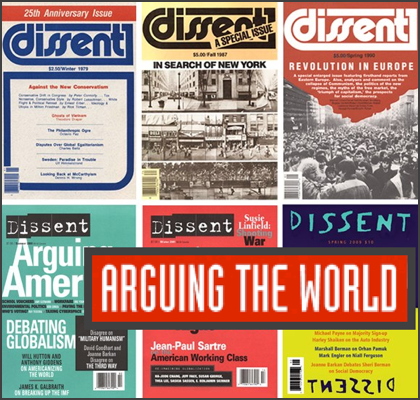A dispatch for the “Arguing the World” blog at Dissent magazine.
Published in Dissent.
Answer me this: Do progressives have anything to lose by opposing Elena Kagan as too conservative to be a satisfactory pick for the Supreme Court? I don’t think so. And I think we lose a lot by simply defending Obama’s choice out of deference to the administration.
Last Tuesday, the The New York Times noted an important trend; namely, the right has been very successful in appointing real conservatives to the court, while the left never gets its own stalwarts seated. The article explains:
“The selection of Solicitor General Elena Kagan to be the nation’s 112th justice extends a quarter-century pattern in which Republican presidents generally install strong conservatives on the Supreme Court while Democratic presidents pick candidates who often disappoint their liberal base.
Ms. Kagan is certainly too liberal for conservatives, who quickly criticized her nomination on Monday as a radical threat. But much like every other Democratic nominee since the 1960s, she does not fit the profile sought by the left, which hungers for a full-throated counterweight to the court’s conservative leader, Justice Antonin Scalia.
….
[N]o Democratic nominee since Thurgood Marshall in 1967 has been the sort of outspoken liberal champion that the left craves, while Justice Scalia has been joined by three other solid conservatives in Chief Justice John G. Roberts Jr. and Justices Clarence Thomas and Samuel A. Alito Jr. By all accounts, Mr. Obama did not even consider the candidates favored most by the left, like Harold Hongju Koh, his State Department legal adviser, or Pamela S. Karlan, a Stanford Law School professor.”
Since the announcement of the Kagan appointment on Monday, several progressive commentators have noted that her confirmation would end up pushing the court further to the right, as she is not as progressive as outgoing Justice John Paul Stevens. Norman Solomon, for one, quoted law professor Francis Boyle:
““During the course of her Senate confirmation hearings as Solicitor General, Kagan explicitly endorsed the Bush administration’s bogus category of ‘enemy combatant,’ whose implementation has been a war crime in its own right,” University of Illinois law professor Francis Boyle noted last month. “Now, in her current job as U.S. Solicitor General, Kagan is quarterbacking the continuation of the Bush administration’s illegal and unconstitutional positions in U.S. federal court litigation around the country, including in the U.S. Supreme Court.”
Boyle added: “Kagan has said ‘I love the Federalist Society.’ This is a right-wing group; almost all of the Bush administration lawyers responsible for its war and torture memos are members of the Federalist Society.“”
Likewise, Glenn Greenwald provided a detailed assessment at Salon in which he asked, “Why is it seemingly impossible to find even a single utterance from her during the last decade regarding the radical theories of executive power the Bush administration invoked to commit grave crimes and other abuses?” And Marjorie Cohn at Alternet wrote, “During her confirmation hearing for solicitor general, Kagan agreed with Senator Lindsey Graham that the president can hold suspected terrorists indefinitely during wartime, and the entire world is a battlefield.” In contrast, Cohn argues, “Justice Stevens ruled in favor of broad enforcement of our civil rights laws.”
While right-wingers have been trying to paint Kagan as another Obama-style Commie firebrand, there’s nothing in her thin record which would suggest that. The best they can come up with is that she opposed “don’t ask, don’t tell” and that she clerked for a true liberal, Marshall. Yet they are trying to make a big stink on both counts.
THIS BRINGS ME TO the strategic point. No matter how centrist a pick Obama puts forward, the right attacks with all its might. Progressives, meanwhile, are put in the position of defending a potential Supreme Court justice who hardly represents our ideals and is nowhere near the champion that conservatives got in Scalia, Alito, Thomas, or Roberts. This sounds to me like a recipe for rightward drift.
It’s a lot like in the legislative arena, when the Democrats put forward pre-compromised positions, which are then further diluted in debate with Republicans. I can be convinced on some issues that progressives should get behind a compromise position because it may be the best we can get at a given time, that the perfect should not be the enemy of the good, and that taking a more radical stance and getting shot down damages a wider progressive agenda. (There was a worthwhile debate on this point on health care, for instance.) But with the Supreme Court, I just don’t see the case for getting behind an uninspired centrist. If we had ended up with Kagan after a long, bloody fight which made clear that it was politically impossible to confirm a better candidate, that would be one thing. As it is, I believe the left should be demonstrating that there’s a vocal constituency for a more resolute progressive candidate and that someone like Kagan is a needless concession to conservatives.
Another interesting passage in the Times article states:
““What does President Obama gain by putting forward an unabashed progressive, liberal judicial activist?” asked Leonard A. Leo, a conservative leader who helped President George W. Bush confirm Chief Justice Roberts and Justice Alito. “Polling suggests that’s not something that adds a lot of value to his own immediate political objectives.“”
At the core of politics is the job of creating a sense for elected officials that there is a political price to be paid for taking one position rather than another. Unless progressives are willing to demonstrate to Obama that lackluster picks such as Kagan anger his Democratic base and make it harder for him to operate in other arenas, we’ll be left to hope that he will take more daring stances in the future out of conviction alone. Needless to say, that’s not something that happens all too often in Washington.
